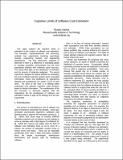| dc.description.abstract | This paper explores the cognitive limits of
estimation in the context of software cost estimation.
Two heuristics, representativeness and anchoring,
motivate two experiments involving psychology
students, engineering students, and engineering
practitioners. The first experiment, designed to
determine if there is a difference in estimating ability
in everyday quantities, demonstrates that the three
populations estimate with relatively equal accuracy.
The results shed light on the distribution of estimates
and the process of subjective judgment. The second
experiment, designed to explore abilities for estimating
the cost of software-intensive systems given incomplete
information, shows that predictions by engineering
students and practitioners are within 3-12% of each
other. The value of this work is in helping better
understand how software engineers make decisions
based on limited information. The manifestation of the
two heuristics is discussed together with the
implications for the development of software cost
estimation models in light of the findings from the two
experiments. | en_US |
